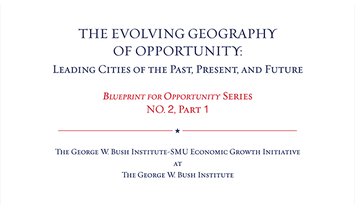
Cities which rise up as centers of prosperity and opportunity are places that ensure an emphasis on learning and innovation, a culture of openness to newcomers and unorthodox ideas, a favorable environment for commerce, a relatively good quality of life for residents, and a strong sense of shared community. The geography of opportunity is always evolving, as some cities emerge as centers of opportunity while others decline, with enormous consequences for people, places, and, indeed, civilizations.
Technological progress, globalization, shifting preferences, and public policy differences are driving transformative changes in America today. The COVID-19 crisis has accelerated powerful trends that were already underway, magnifying the role of local community and quality-of-life features in shaping people’s location choices and thus driving shifts in many local economies. A diverse array of thriving, high-opportunity metropolitan areas offers lessons on how to expand opportunity and economic mobility, while emerging turnaround stories are also developing in struggling regions of the Nation.
Download the Data
View the data used to create this report. (Excel)
Lessons from history and from the relative success stories of the present point to clear priorities for today’s cities:
- Get the urban basics right: schools, safety, livability.
- Strengthen local anchor institutions in higher education, health care, and other areas.
- Invest aggressively in local quality-of-life amenities.
- Rebuild and expand critical infrastructure.
- Work toward openness, diversity, inclusion, and a welcoming approach to newcomers.
- Ensure a high degree of economic freedom.
- Emphasize housing affordability and work to build an opportunity-rich physical environment.
Read the full report (PDF opens in new tab or window)
This piece first appeared on BushCenter.org.
J.H. Cullum Clark is Director, Bush Institute-SMU Economic Growth Initiative and an Adjunct Professor of Economics at SMU. Within the Economic Growth Initiative, he leads the Bush Institute’s work on domestic economic policy and economic growth. Before joining the Bush Institute and SMU, Clark worked in the investment industry for 25 years.












